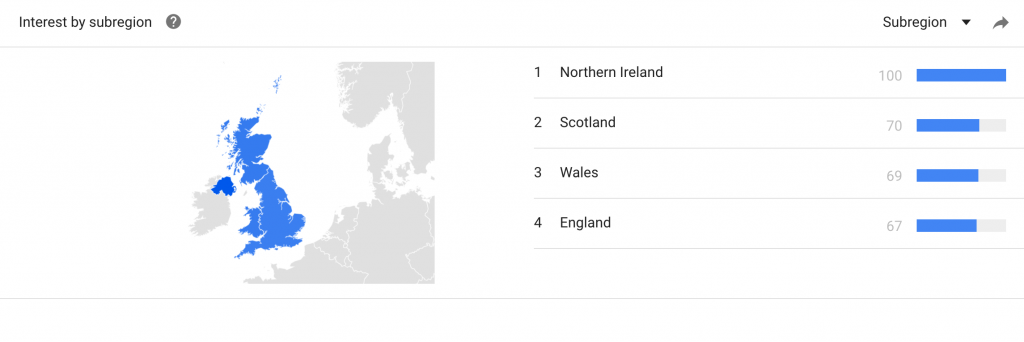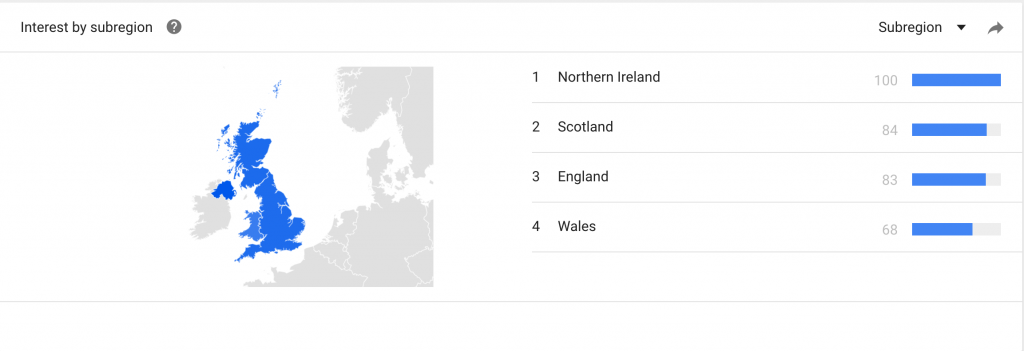You’ve asked the internet what human rights are, and what the Human Rights Act is – but does it make a difference where in the UK you’re searching from?
Interestingly, Google says yes. Across the last five years, “human rights” and “rights” were more popular searches in Scotland, Northern Ireland, and Wales than in England. As constituent countries of the UK, all four nations are bound by the Human Rights Act and the protections which this gives people. So are there any reasons for why people in the devolved nations might be looking for this type of information more than their English neighbours?
Give me some figures
 Image Credit: Google Trends
Image Credit: Google Trends
Google Trends measures the area where a search term was most popular, by calculating a value on a scale of 0 – 100. A higher value means a higher proportion of all queries, not a higher number of all queries. Where there is a value of 100, it means that this is the location where a search term was the most popular as a fraction of total searches there.
In relation to a search for “human rights”, Northern Ireland comes out top over the past five years with a value of 100.
Subsequent values are then assigned as a fraction of total searches in that location. So compared to Northern Ireland’s score of 100, Scotland comes next with a score of 70, followed by Wales with score of 69. England brings up the rear with a score of 67.
Why is that?
 Image Credit: SkitterPhoto / Pexels
Image Credit: SkitterPhoto / Pexels
Although all four countries make up the United Kingdom, each has their own distinct culture, identity and history, which may go some way towards explaining the differences.
Take Scotland, for example. Going way, way back to the 18th century (bear with me) the country went through a period known as the Scottish Enlightenment. Over the course of several decades, there was an outpouring of scientific and intellectual accomplishments which had as their focus a philosophy of liberalism and a belief in human rights. This has shaped much of modern Scotland and may form the foundation for much of the interest in human rights today.
Similarly, in Wales, a strong history of Liberalism and a labour movement, and industrialism and a powerful trade union movement may all account for the country’s interest in human rights.
But we don’t even have to go that far back. When the period of time known as “the Troubles” came to an end in Northern Ireland with the Good Friday Agreement in 1998, the protection of equality and human rights were at the very heart of the peace and reconciliation process. The agreement enshrined “the mutual respect, the civil rights and the religious liberties of everyone in the community” and made sure that the public institutions (like the police and the army) which had been at the root of many of the problems could be held accountable, by the people for their actions. Put simply, of all the countries in the UK, Northern Ireland has felt the absence of, and the need for, human rights most acutely.
So what does all that have to do with Google?
 Image Credit:WOCinTechChat.com
Image Credit:WOCinTechChat.com
The history of each nation may account for some of the reasons why interest in human rights is higher among the devolved nations. But there are many recent developments which may also explain why people in those countries are searching more for human rights topics.
Despite all of the progress made in Northern Ireland, they are still grappling with many issues in relation to human rights: women’s right to an abortion, the DUP’s new alliance with the Conservatives in Westminster and questions about how Brexit will affect the Good Friday Agreement have all dominated the headlines in recent months. Internet searches about the relevance of all of these on the human rights of people living there may well account for many of the total searches.
In Scotland, huge strides have been made recently in terms of equality and human rights. For a country that only legalised homosexuality in 1980 – 13 years after England and Wales – it has now been identified as the best country in Europe in terms of legal protections for LGB people, with four leaders of its main political parties openly lesbian, gay or bisexual. Perhaps some of the searches there are about celebrating how far we’ve come?
And, let’s not forget, human rights and the UK’s membership of the Human Rights Convention are intricately linked with the devolution of powers from Westminster to Scotland, Northern Ireland, and Wales – making it likely that they will all play a critical role in deciding any future planned changes for the Human Rights Act. It’s possible that a large proportion of those Google searches are coming from people within the devolved nations wondering what the future might hold.
What now?
 Image Credit: Google Trends
Image Credit: Google Trends
Over the last year, things do seem to have been levelling out. Across the last 12 months, Wales has dropped to the bottom of the list of searches for human rights, while England and Scotland have drawn even with one another.
Looking at the UK as a whole, you can see spikes in searches for human rights in August 2016 (around the time plans were announced to scrap the Human Rights Act), December 2016 (peaking around 10 December – aka Human Rights Day!) and June 2017 (when that whole General Election thing was going on…).
Searches for Theresa May (and presumably her plans for the Human Rights Act – whatever they may be), women’s rights (in no small part down to a certain US president); and gender are all “rising topics” according to Google Trends, meaning these are the most frequently searched topics compared to this time last year.
So it looks like despite all our differences, we’re all still looking for information about how what’s happening in the world will impact on our human rights. And the more you’re informed, the more you can do to make a difference – wherever you are in the UK.







